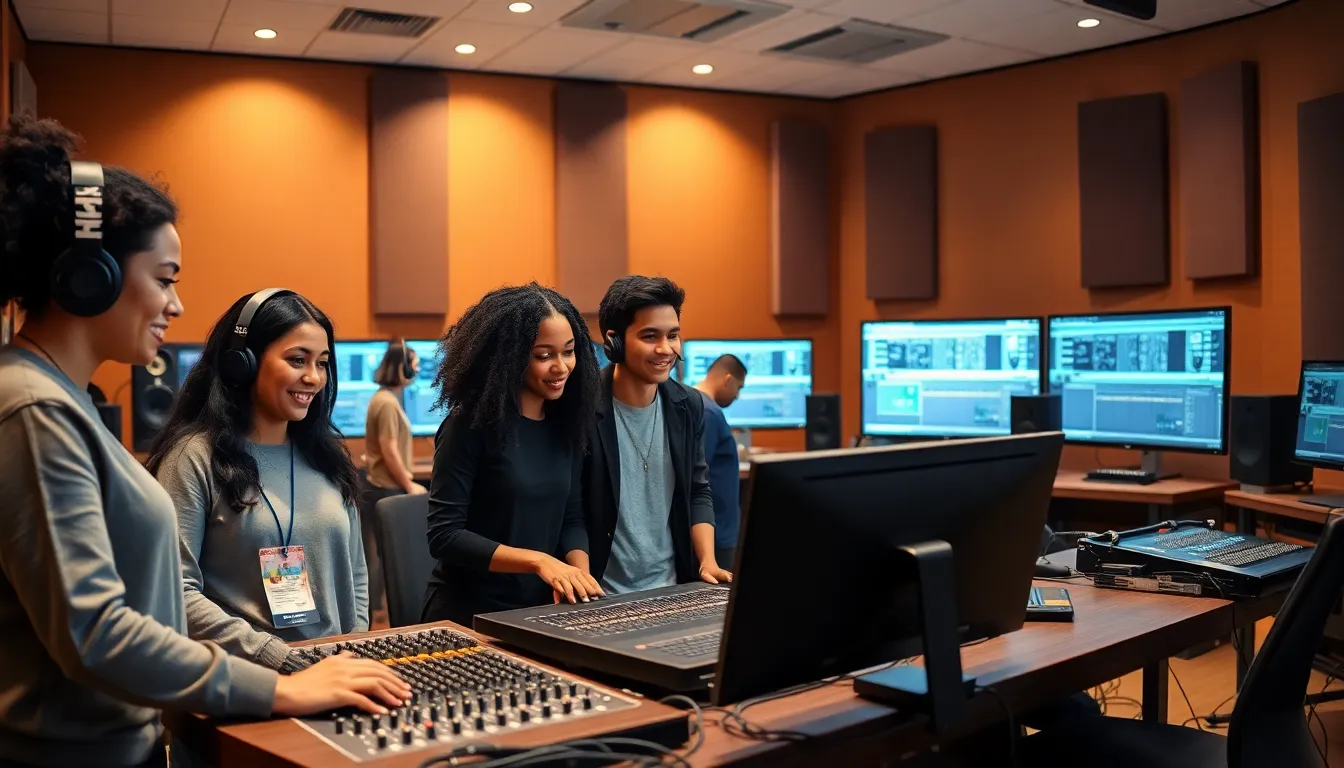Imagine stepping into a world where sound transforms into art. An audio technology degree does just that, opening doors to creative and technical mastery. Whether it’s crafting a hit song or enhancing a theater’s acoustics, this degree empowers individuals to play an integral role in diverse industries. If you’ve ever dreamt of working with sound, this path might just strike a chord you can’t ignore.
Table of Contents
ToggleOverview of Audio Technology Degrees

The realm of audio technology encompasses a rich blend of artistic creativity and technical proficiency. An audio technology degree equips students with a strong foundation in sound engineering and production techniques. These programs often allow individuals to explore various aspects of sound, from music production to audio post-production for film and television. Students immerse themselves in both theoretical and practical learning, ensuring they develop vital skills that employers across industries seek.
Key Subjects Covered in Audio Technology Programs
Each audio technology program presents a unique curriculum, but specific subjects typically dominate the landscape. Students can expect to investigate into:
Sound Design
This subject focuses on the creation and manipulation of audio elements in various contexts such as film and video games.
Audio Engineering
Here, the technical aspect shines: students learn about recording, mixing, and mastering sound.
Music Production
Courses dedicated to music production highlight song arrangement, instrumentation, and industry-standard software use.
Digital Audio Workstations (DAWs)
Familiarity with software tools like Pro Tools, Logic Pro, or Ableton Live is crucial, so these platforms receive focused instruction.
Acoustics
Understanding sound wave behavior and the physical properties of sound waves helps students create better audio environments.
With these subjects under their belts, graduates emerge prepared to tackle real-world audio challenges.
Types of Audio Technology Degrees
Audio technology degrees come in various formats, catering to different aspirations and needs. Higher education institutions offer:
Associate Degrees
These two-year programs provide a solid foundation in audio technology, allowing individuals to enter the workforce quickly and gain hands-on experience.
Bachelor’s Degrees
A four-year degree deepens knowledge and skills, often focusing on more advanced topics in audio engineering and production.
Master’s Degrees
For those seeking specialized expertise or management roles, a master’s degree can be invaluable, providing advanced study options in areas like sound design or acoustics.
Certificate Programs
Shorter certification courses are available for quick skill upgrades, targeting specific skills without the commitment of a full degree.
Career Opportunities with an Audio Technology Degree
Graduates with an audio technology degree unlock a broad range of career opportunities. Some popular roles include:
Audio Engineer
These professionals work in studios, managing sound recording and mixing, essentially the backbone of music production.
Sound Designer
In this role, individuals create audio elements for media, enhancing the storytelling experience in films and video games.
Live Sound Technician
These technicians oversee sound production for live events, ensuring everything resonates harmoniously with the audience.
Music Producer
As a music producer, one inspires and leads the creative process in music production, shaping the sound and vision of albums.
Post-Production Engineer
Working in film and TV, these engineers handle audio editing, adding effects, dialogue replacement, and sound mixing.
Skills Gained through Audio Technology Education
Pursuing an audio technology degree fosters a diverse skill set that stands out in the job market. Key skills include:
Technical Proficiency
Graduates become experts in using a variety of audio software and equipment, crucial for any audio-related role.
Creative Thinking
Creativity flourishes as students learn to produce and manipulate sound in innovative ways, encouraging out-of-the-box problem-solving.
Collaboration
Most projects require teamwork: students develop vital communication skills and learn to collaborate effectively with peers.
Project Management
Handling multiple projects simultaneously equips graduates with time management and organizational skills, essential in fast-paced environments.
Choosing the Right Audio Technology Program
Selecting the right audio technology program is crucial for shaping one’s future in sound. Here are some factors to consider:
Accreditation
Opt for institutions with proper accreditation to ensure a quality education recognized by employers.
Faculty Expertise
Learn about the faculty’s background. Experts with industry experience can provide invaluable insights and networking opportunities.
Equipment and Facilities
Access to modern studios and technology enhances the learning experience, making it essential to visit campuses if possible.
Internship Opportunities
Programs that offer work placements give students real-world experience, making them more attractive to future employers.







